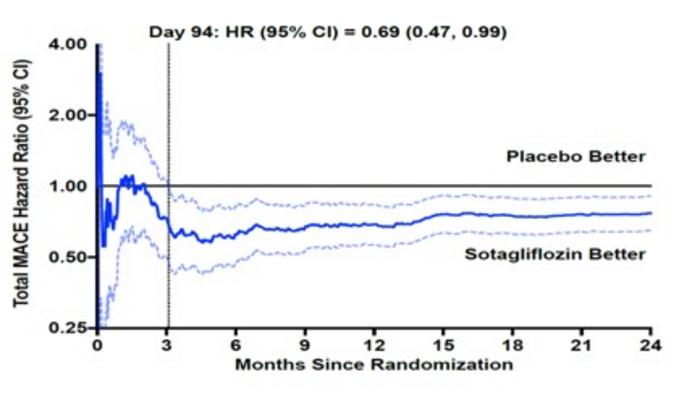
Sotagliflozin, an innovative drug approved by the Food and Drug Administration, represents a significant advancement in the treatment of type 2 diabetes and associated cardiovascular conditions, specifically targeting patients with chronic kidney disease and multiple cardiovascular risk factors. The drug, which functions as a sodium-glucose cotransporter (SGLT) inhibitor, embodies a dual-action mechanism by inhibiting both SGLT1 and SGLT2 proteins. This combination effectively manages blood sugar levels while also providing critical cardiovascular protection, a breakthrough that promises to shift treatment paradigms in managing diabetes and its related complications.
The recent international clinical trial led by researchers at Mount Sinai has provided compelling evidence illustrating the cardiovascular benefits of sotagliflozin. Encompassing a diverse group of 10,584 patients, the randomized multicenter study—known as the SCORED trial—investigated the impact of sotagliflozin on the incidence of major adverse cardiovascular events such as heart attacks and strokes. With a follow-up period averaging 16 months, findings revealed that patients receiving sotagliflozin experienced a remarkable 23 percent reduction in serious cardiovascular outcomes compared to those administered a placebo.
Sotagliflozin’s mechanism of action is particularly noteworthy. The drug’s ability to inhibit SGLT1 receptors, which are primarily located in areas including the kidney, gut, heart, and brain, coupled with the inhibition of SGLT2 receptors, positions it uniquely among SGLT2 inhibitors currently in widespread use. These receptors play critical roles in glucose reabsorption and sodium transport, and the blockade of SGLT1 is what sets sotagliflozin apart, allowing for enhanced cardioprotective effects that are not typically observed with existing SGLT2 inhibitors.
The SCORED trial’s results signify more than just statistical success; they herald a new chapter in cardiovascular care for patients with diabetes and chronic kidney disease. This research positions sotagliflozin as a versatile option in the management of cardiovascular risk, with implications for reducing heart failure and the progression of kidney disease. Clinical leaders, including Dr. Deepak L. Bhatt, emphasize the transformative potential of sotagliflozin, which offers a novel approach to mitigating the risks associated with heart attacks and strokes among high-risk populations.
The broader implications of these findings could significantly enhance patient care across healthcare systems globally. As sotagliflozin gains recognition, physicians may soon have access to this tool as a critical component in their arsenal against cardiovascular events. The integration of sotagliflozin into treatment protocols for patients with either type 2 diabetes or heart failure could fundamentally alter therapeutic approaches, leading to better patient outcomes and lower hospitalization rates related to cardiovascular complications.
Importantly, this groundbreaking research illustrates a shift in understanding the intersections between diabetes management and cardiovascular health. Historically, cardiovascular events were often overlooked in the diabetes treatment discussion. However, the emerging evidence supporting sotagliflozin highlights the need for a more holistic approach to patient care that encompasses all facets of health, ensuring that diabetes treatment is not solely focused on blood glucose levels but integrates cardiovascular risk reduction as a core component.
As more clinicians become aware of the distinct advantages of sotagliflozin, the potential for improved health outcomes in their patients becomes increasingly tangible. The study’s findings challenge the status quo, encouraging healthcare professionals to reconsider current treatment guidelines and the merits of incorporating this novel medication into standard care pathways. Moreover, as sotagliflozin represents a new mechanism of action in the fight against cardiovascular disease, it could serve as a model for future drug development aimed at harnessing similar multifaceted approaches to treatment.
The study, published in The Lancet Diabetes & Endocrinology, provides significant insights into the possibilities for sotagliflozin’s role beyond traditional diabetes care. Its design as a randomized controlled trial ensures robust data and validity to the claims made regarding its effectiveness. Furthermore, the research was funded by Lexicon Pharmaceuticals, a partnership that underscores the importance of collaboration in advancing medical science and patient care.
Moreover, with the increasing recognition of cardiovascular risk factors in patients with diabetes, there is a growing consensus in the medical community about the urgent need to adopt treatment strategies that encompass comprehensive care. The results stemming from the SCORED trial not only shed light on the capabilities of sotagliflozin but also pave the way for a reevaluation of how cardiovascular risks are managed in diabetic patients moving forward.
Overall, the introduction of sotagliflozin into clinical practice holds the promise of revolutionizing the treatment landscape for individuals facing diabetes and cardiovascular illness. As further studies and ongoing clinical observations continue to solidify its safety and efficacy profile, healthcare providers will be better equipped to address the complex needs of their patients. The insight from this trial serves as a critical reminder that advancements in pharmacotherapy can lead to significant public health benefits, especially in populations at high risk for serious cardiovascular events.
The potential future landscape for diabetes and cardiovascular care is bright, augmented by innovations such as sotagliflozin. The synergy created through combining diabetes management with cardiovascular protection could redefine treatment objectives, ultimately leading to enhanced quality of life for millions of patients worldwide. As this new paradigm takes root, the emphasis on integrated care strategies will be paramount in navigating the complexities of managing both diabetes and cardiovascular health.
In summary, sotagliflozin not only represents a new era in the treatment of diabetes but also stands as a testament to the power of scientific research and collaboration in advancing healthcare. The implications of its use for reducing cardiovascular risks can lead to transformative changes in treatment protocols, emphasizing a holistic approach to patient care that insists on the connection between different health challenges. With this drug at the forefront, we may witness a significant lowering of the rates of heart attacks and strokes among high-risk patients, ultimately saving lives and improving health outcomes.
Subject of Research:
Article Title:
News Publication Date:
Web References:
References:
Image Credits:
Keywords:
Tags: cardiovascular disease medicationchronic kidney disease managementdual-action diabetes therapyFDA approved diabetes medicationheart attack risk reductioninnovative heart failure druginternational clinical trial findingsmajor adverse cardiovascular eventsSGLT inhibitor benefitsSotagliflozin diabetes treatmentstroke prevention medicationtype 2 diabetes advancements





